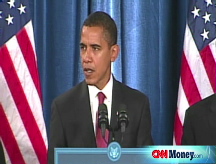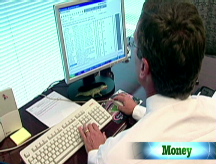Middle-class tax cut may come soon
President-elect Obama promised that 95% of workers would get a net tax cut. Now it seems probable he'll include tax cuts in an economic recovery plan.
NEW YORK (CNNMoney.com) -- Remember all the talk during the presidential campaign about a middle-class tax cut? It could be showing up in your paycheck early next year.
As the debate heats up over how to pull the economy from the ledge, it's likely that tax cuts for the middle class will play a central role.
President-elect Barack Obama hopes to have a massive economic stimulus plan waiting for his signature when he takes office on Jan. 20. It's expected to include hundreds of billions in spending on infrastructure and green energy, but he also made clear last week that he wants it to also feature tax cuts to lower- and middle-income Americans.
Tax cuts are "part and parcel of what we need when it comes to stimulus," Obama said last week.
"We're going to be putting money in people's pockets so that they can spend on buying a new computer for their kid's school, so that they can, you know, make sure that they are able to deal with heat and groceries and all the other strains on the family budget," he added.
The long-term benefit, in his view: It would create more fairness in the tax code.
One promise he made but may hold off on for awhile: the reversal of some of the Bush tax cuts for high-income taxpayers, who are roughly defined as individuals making more than $200,000 and couples making more than $250,000. Specifically, Obama has said he would increase the top two income tax rates and the capital gains rate to their pre-2001 levels.
Mindful that a tax increase during a recession might do more harm than good, he and his advisers have left open the possibility that they might wait to implement the increases until 2011, rather than next year. "Whether [the tax rate changes are] done through repeal or whether that's done because the Bush tax cuts are not renewed is something that my economic team will be providing me a recommendation on," Obama said at a press conference last week.
Some economists think tax cuts for the middle class might be one way to create or save some of the 2.5 million jobs Obama has promised over the next two years if lawmakers put together the kind of stimulus package he envisions.
Others say it's a bad idea.
"It would be a serious mistake to enact tax cuts aimed at increasing already excessive consumption," wrote Stephen Roach, chairman of Morgan Stanley Asia, in the New York Times last week. "The Obama administration needs to encourage the sort of saving that will put consumers on sounder financial footing and free up resources."
So what kind of tax cuts are being considered? Obama's transition team isn't offering details yet and one Democratic aide on the Hill told CNNMoney.com that specifics have not yet been discussed.
But in talking about his economic recovery package, Obama has mentioned his campaign promise to offer a "net tax cut" for "95% of American workers."
One option that could get Obama a good way toward that 95% is his proposed Making Work Pay credit -- a centerpiece promise in his campaign. The credit would essentially work as a payroll tax credit equal to $500 for individuals and $1,000 for couples.
The credit would have an income threshold. Only those making $75,000 or less ($150,000 or less for couples) would get the full credit. Individuals making between $75,000 and $85,000 (and couples making between $150,000 and $170,000) would get a partial credit.
The credit also would be refundable, meaning that even tax filers without any tax liability -- typically very low-income workers -- would receive one.
Rather than mail out checks to consumers, the IRS, together with employers, could coordinate a change in how much money is withheld from workers' paychecks, so they'd simply get a bigger paycheck.
Economist Mark Zandi, however, believes a payroll tax credit like the kind Obama has proposed could be tricky to implement because it's based on income. As a result, it could take longer to take effect than, say, an across-the-board payroll tax holiday -- a temporary suspension of the payroll tax viewed by some as another way to boost spending.
"Under the Obama payroll tax credit, payroll and other accounting software would have to be recoded and implemented across many businesses," said Zandi, chief economist for Moody's Economy.com.
Even though the short-term impact of such a credit could be muted, it has more potential bang for the buck in the long run than a tax holiday.
"A payroll tax credit would provide more of a spending boost since it is a permanent change in the tax code," Zandi said. "Households are more likely to spend a tax cut if it is the result of a permanent change rather than a temporary one." ![]()






